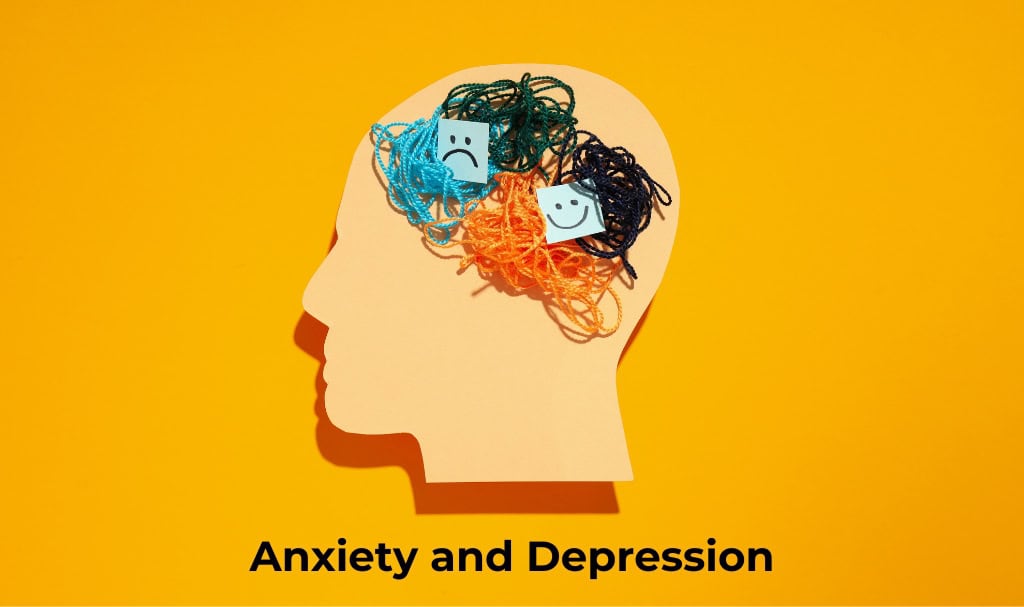In the fast lane of modern life, mental health is more crucial than ever. We’re all catching on that mental health isn’t just a trendy topic—it’s the key to living our best lives. Furthermore, anxiety and depression are the ‘big bullies of the mental health world‘, often tagging in together. But what’s the real deal between them? And which one is the bigger bully – Anxiety or Depression?
Well, let’s dive in, decode, and understand the complex link between anxiety and depression.
Why Mental Health Matters?
Mental health is how we feel, think, and connect with others. It is a bedrock of our emotional and social lives. Moreover, when our mental health condition is on point, we handle stress more effectively, make wiser choices, live in the present, and enjoy life. But when it’s off-kilter, everything can feel like wading through molasses, from daily tasks to relationships.
What is Anxiety?
Anxiety is like stress on steroids, cranking up the jitters and keeping you on edge nonstop. Imagine your brain being stuck in overdrive, constantly worrying, and unable to chill.
Ever wonder why it feels impossible to calm down? It’s normal to feel anxious sometimes—like before a big test or a job interview—but chronic anxiety is a whole different ballgame: picture Generalized Anxiety Disorder (GAD), panic attacks, or social anxiety.
These mental health conditions and disorders bring on relentless worry that messes with your daily groove. Imagine a person, who has GAD. Every day, he/she feels like preparing for a major presentation that never happens. People with GAD can experience their minds constantly racing with “what ifs,” making it hard for them to concentrate at work and enjoy their social outings.
Common Symptoms of Anxiety:
- Chronic worry
- Restlessness and irritability
- Muscle tension
- Trouble concentrating
- Sleep problems
- Avoidance
Struggling with Anxiety and Depressive Disorders?
Contact Town Psychological Services Today
What is Depression?
Depression is way more than just having a rough day or feeling down in the dumps. It’s a serious mental health issue that messes with your emotions, thoughts, and how you deal with everyday life. Persistent depressive disorder is like having a rain cloud follow you around for years, whereas bipolar disorder is characterized by extreme swings between super highs and low lows.
Key symptoms:
- Constant sadness
- Loss of interest in activities once enjoyed
- Fatigue and low energy
- Difficulty concentrating and making decisions
- Changes in appetite and sleep patterns
- Withdrawal
The Connection Between Anxiety and Depression
Anxiety and depressive disorders often occur together. Why do people experience both conditions simultaneously? It’s common due to overlapping symptoms, shared genetic factors, and similar environmental triggers.
Have you ever noticed difficulty concentrating, irritability, or sleep issues? These symptoms are shared by both conditions. Could your genetics be making you more prone to anxiety and depressive disorders? Stressful life events, trauma, and chronic stress are also known triggers. How do these factors play a role in your mental health?
Which Is Worse: Anxiety or Depression?
Deciding which is worse isn’t straightforward because both can be equally challenging, affecting individuals differently. Additionally, the impact of each condition varies based on severity, duration, and individual resilience.
- Functional Impairment: Depression often leads to more significant functional impairment than anxiety. Furthermore, severe depression can make daily tasks feel impossible and lead to isolation and inactivity.
- Physical Health: Both conditions negatively affect physical health, especially to your nervous, cardiovascular, digestive, immune, and respiratory systems.
- Suicide Risk: Depression has a higher risk of suicide than anxiety. However, severe anxiety disorders can also lead to suicidal thoughts, especially when combined with depression.
Managing Anxiety and Depression: Anxiety and Depression Treatment
The Anxiety and depression treatment typically involves a mix of therapy, medication, lifestyle changes, and support from loved ones.
Try the Therapy
Cognitive-behavioral therapy (CBT) is like a mental reset button. Furthermore, it helps you to change negative thoughts and unhelpful habits. For example, if social anxiety’s your jam, CBT can teach you to challenge those fears and slowly face social situations without freaking out.
Prescribed Medication
Antidepressants and anti-anxiety medications, like SSRIs (think Prozac, Zoloft), balance brain chemicals that mess with your mood and stress levels. In addition, they help clear the mental fog and make anxiety and depression more manageable.
Small Lifestyle Changes can Bring Big Difference
Hitting the gym, eating clean, and getting enough sleep are essential for mental health. Looking for an easy hack for improved mental health? Mindfulness and relaxation techniques like meditation and yoga can do wonders.
Trust Your Support System
Your squad is everything. Staying close to friends & family or joining support groups gives you the emotional backup you need. Moreover, sharing your journey with a support group can make you feel less alone and provide some advice.
Wrapping it up: Mind that Matters
Mental health is essential for our overall well-being. Anxiety and depression are two of the most significant challenges many people face. Furthermore, understanding their connection and impact can lead to better management and improved quality of life. While both conditions are serious, neither is definitively worse than the other. Hence, they both need attention, understanding, and proper treatment.
If you’re struggling with anxiety or depressive disorders, you don’t have to face it alone. Contact our mental health professional near me for support and take the first step towards a healthier and more fulfilled you. Contact Town Psychological Services to schedule an appointment and start your journey to well-being.

